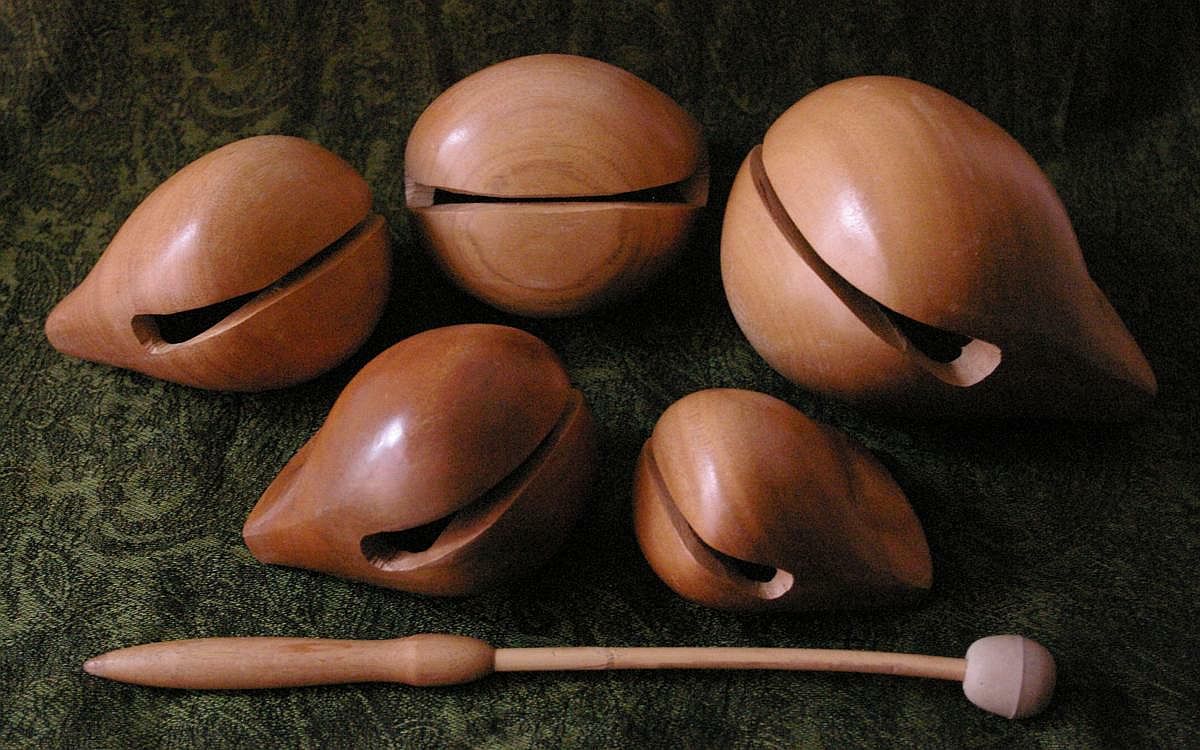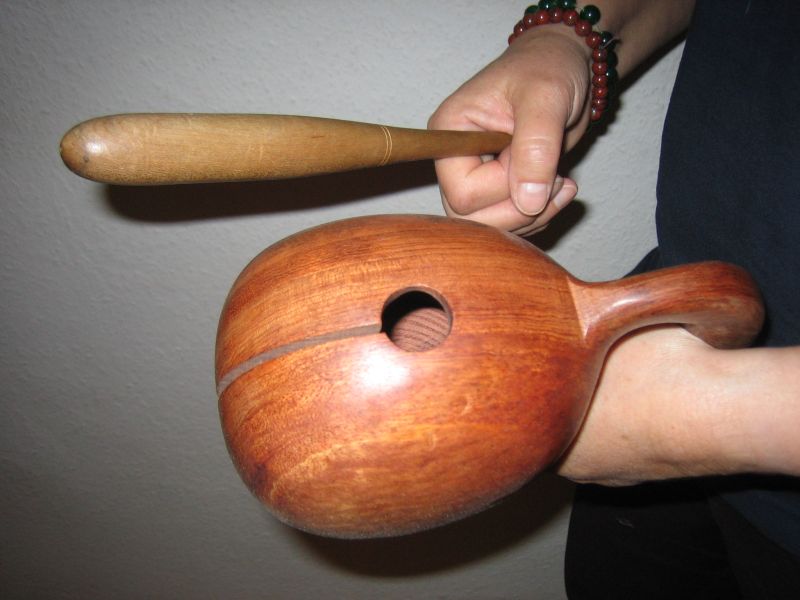Playing method and application of wooden fish
1267 views · Organized by 风月呢喃 on 2022-02-08
When playing, the large group of fish-shaped wooden fish needs to be placed on the ground, the small round fish-shaped wooden fish is supported with the left hand, and the right hand is percussion with the olive-shaped wooden hammer. musical instrument. It is often used in drama, folk accompaniment, instrumental ensemble, ethnic band and religious music.
In the folk instrumental ensembles such as Jiangnan Sizhu, Sunan Chuuting, Zhedong Chuida, Hebei Chugging, etc., small groups of fish-shaped wooden fish are often used. It is often used in conjunction with the drum board. pat. In instrumental ensembles such as Shifan gongs and drums, Fuzhou Shifan, Minnan Shiyin, and Fujian Nanyin, the small wooden fish is an indispensable instrument. In addition to tapping and tapping, the sound it produces is regarded as one of the main timbres. one.
In the folk bands, there are always a whole set of fish-shaped wooden fish with different pitches and numbers. They are arranged in sets according to the pentatonic scale, the seven-tone scale or the twelve equal temperament. They are mostly used to match the lively and lively tunes. It can also be used to imitate the sound effect of the galloping horse. In Buddhist and Taoist music, the wooden fish is both a magical instrument and an inseparable rhythm instrument.

Tuanyu-shaped wooden fish is also used in Quyi wooden fish songs. Muyu Song, also known as Sing Muyu or Muyu Book, is a free-rhythm recitation style of rap. In the past, it was mostly performed by housewives in Guangzhou dialect. When singing, there was no accompaniment of musical instruments such as blowing, pulling, and playing. This form of folk rap started in the Ming Dynasty and was widely spread in Guangzhou, Nanhai, Panyu, Shunde and other places in Guangdong Province. The singing of Muyu Song was later absorbed into Cantonese Opera as a kind of singing. The long pieces include "Hua Jian Ji", "History of Lotus Flowers", etc., and the short pieces include "Pipa on the Road", "Rooftop Meeting" and so on.

In the folk instrumental ensembles such as Jiangnan Sizhu, Sunan Chuuting, Zhedong Chuida, Hebei Chugging, etc., small groups of fish-shaped wooden fish are often used. It is often used in conjunction with the drum board. pat. In instrumental ensembles such as Shifan gongs and drums, Fuzhou Shifan, Minnan Shiyin, and Fujian Nanyin, the small wooden fish is an indispensable instrument. In addition to tapping and tapping, the sound it produces is regarded as one of the main timbres. one.
In the folk bands, there are always a whole set of fish-shaped wooden fish with different pitches and numbers. They are arranged in sets according to the pentatonic scale, the seven-tone scale or the twelve equal temperament. They are mostly used to match the lively and lively tunes. It can also be used to imitate the sound effect of the galloping horse. In Buddhist and Taoist music, the wooden fish is both a magical instrument and an inseparable rhythm instrument.

Tuanyu-shaped wooden fish is also used in Quyi wooden fish songs. Muyu Song, also known as Sing Muyu or Muyu Book, is a free-rhythm recitation style of rap. In the past, it was mostly performed by housewives in Guangzhou dialect. When singing, there was no accompaniment of musical instruments such as blowing, pulling, and playing. This form of folk rap started in the Ming Dynasty and was widely spread in Guangzhou, Nanhai, Panyu, Shunde and other places in Guangdong Province. The singing of Muyu Song was later absorbed into Cantonese Opera as a kind of singing. The long pieces include "Hua Jian Ji", "History of Lotus Flowers", etc., and the short pieces include "Pipa on the Road", "Rooftop Meeting" and so on.
Involving musical instruments
Wooden fish (pinyin: Mùyú) is a kind of wooden percussion instrument. The common fish-shaped wooden fish is shaped like a round sphere close to a fist, and the middle part is hollow, which is used for sound resonance and amplification. There is a sound hole on one side of the sphere, which has the same function as the F-shaped hole of a violin. It allows the amplified sound to spread. on the shelf. The method of playing is to use a drum stick or a small wooden hammer to hit the resonance area on the outside of the instrument to make a sound. The size of the wooden fish can be of different sizes, the larger the volume, the lower the pitch.
Guess you like
Organized by 阿弥 on 2022-03-04
In the morning and evening homework and daily Buddhist affairs, there are several kinds of instruments that are commonly used. The postures used can be summarized as follows: the chime is drawn to the mouth, the wooden fish is put together, the pan is facing the face, the hafnium is flat-chested, and the hand drum is holding the moon.
read >>
Organized by 一口泡芙 on 2022-02-08
The wooden fish is a kind of wooden percussion instrument. The common wooden fish is shaped like a round sphere like a fist, and the middle part is hollow, which is used for sound resonance and amplification.
read >>
 渝公网安备 50010702504639号
渝公网安备 50010702504639号